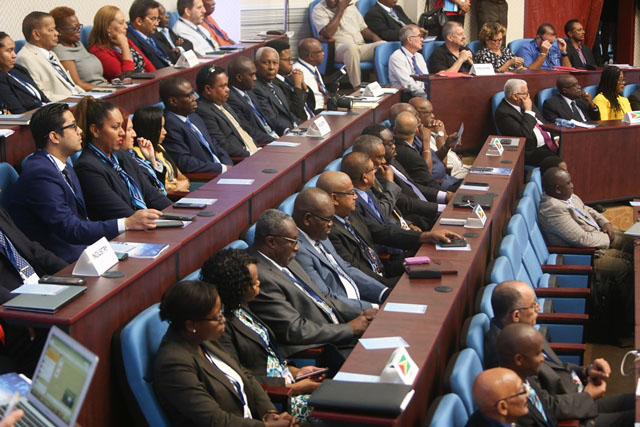More than 400 representatives from various member states of the International Civil Aviation Organisation (ICAO), gathered yesterday at the Arthur Chung Convention Centre for the official opening of an Air Transport Meeting.
The meeting is centred on the need to proffer practical solutions to remove existing regulatory impediments to air transport liberalisation and to finance the development of quality aviation infrastructure, with the follow-up to the ICAO Statement on the Development of Air Transport in North America, Central America, the Caribbean and South America.
Addressing a number of delegates from around the world, President of the Council of the ICAO, Dr. Olumuyiya Bernard Aliu, in his delivery of the opening remarks, emphasized the need for harmonization of air transport regulations.
He noted that not only has aviation served to link people, places and cultures the world over, but noted that it has since become an essential component of our global society and is a crucial driver of economic, social and cultural development worldwide.
“Air transport is, by far, the safest mode of transportation and today, it secures more than 52.7 million jobs globally and generates some $7.7 trillion in economic activity. International aviation carried 4.1 billion passengers and 56 million tons of freight on 37 million flights in 2017,” the president said, while noting that these
figures are projected to double in the next 15 years.
It is with these projections in mind that countries must continue to build their ICAO global standards, and foster an operating environment under which the industry can enjoy dependable and sustainable profitability. Such efforts should include the liberalisation and modernisation of the regulatory framework for International Air Transport.
On the other hand, Dr. Aliu explained that the ICAO is conscious that as liberalisation progresses, aviation operating environments will become more competitive and market driven. As a result, there will be need for more protection for the rights of passengers.
To this end, the ICAO assembly has endorsed a high level of core principles on consumer protection. These guidelines can be of great assistance to states and industries as they seek to adopt regulations and practices for passengers which are globally consistent, and in turn, foster versatility and economic prosperity.
Another key priority for the ICAO, he said, is the continuous and unfortunate proliferation of taxes and levies on aviation operations. This will inevitably have a negative long-term impact on both operators’ bottom-lines, general sustainability of air services, and result in delays of ICAO’s release of policies which seek to foster a reasonable, yet more dependable and sustainable generation of its revenues.
Cost recovery
“We should recognize here for example that in this region, today, that there are about 130 different taxes and fees, of which the great majority have no relation whatsoever to cost recovery for aviation services for infrastructure expenditure. The sheer amounts of these taxes are a percentage of ticket prices, between 15%-20%’,” he disclosed, before advising that a reassessment should be done.
Notwithstanding, Dr. Aliu said that the aviation sector is currently in the most challenging phases in aviation growth, by which everyone is affected. He noted, however, that ICAO has been working very hard to raise global awareness and political will towards governments’ development towards expansion and modernisation of national aviation infrastructure.
Delivering the keynote address yesterday was Prime Minister Moses Nagamootoo, who noted that the hosting of the meeting in Guyana comes as the country is working to improve the sector. The Prime Minister went on to mention the passing of the revised Civil Aviation law, which occurred during Monday’s sitting of the National Assembly.
“Aviation in Guyana is the primary channel to connect internationally. With a land space of 83,000 square miles, some 80 per cent of which is pristine, tropical rainforest, aviation is vital to connecting our coastland with riverain and hinterland communities, most of which are populated by our Indigenous peoples. Our aviation sector is moving in the right direction and is growing. In 2017, Guyana recorded its highest international passenger movement in the history of the aviation sector – in excess of 650,000 passengers. Guyana’s compliance with ICAO Standards and Recommended Practices are up – increasing from 44 percent to 64 percent – with projection to reach at least 80 percent by December 31, this year,” the Prime Minister said.
He also noted that Guyana is part of the Caribbean Region, to which air transport is a vital factor in determining the viability and sustainability of tourism for which it is globally known for; as such, the region is always looking for new ways to promote connectivity.
Commenting directly on Guyana’s status in the industry, the Prime Minister explained that with first oil expected soon, Guyana has become an attractive market for airlines and a preferred business and tourist destination.
Nagamootoo also sought to remind those gathered of the efforts already made to promote connectivity in the region, as he alluded to the signing of the Multilateral Air Services Agreement (MASA) by Heads of Government of the various CARICOM Member States in July of this year.
This agreement is one that essentially allows for free movement of airlines within the CARICOM region.
“It is our government’s view that if we are going to promote connectivity, these are the initiatives that are necessary to facilitate the movement of people, goods and services,” the Prime Minister remarked.
Meanwhile, Junior Minister of Public Infrastructure, Annette Ferguson said “Guyana’s compliance with ICAO is on the increase as we remain committed to green aviation. This is demonstrated in the participation of ICAO carbon off-setting and reduction scheme from international aviation slated to commence in 2021”.










